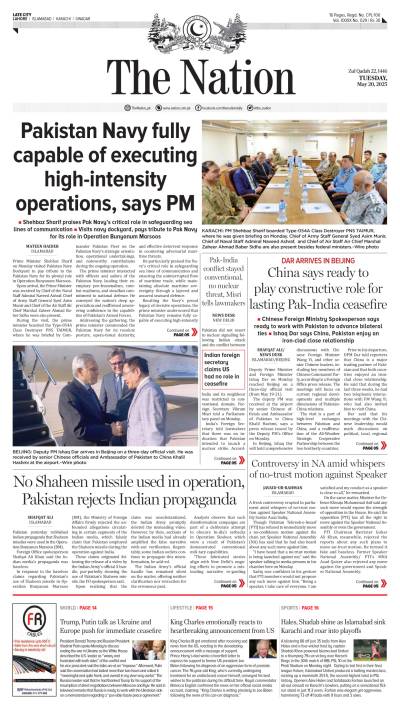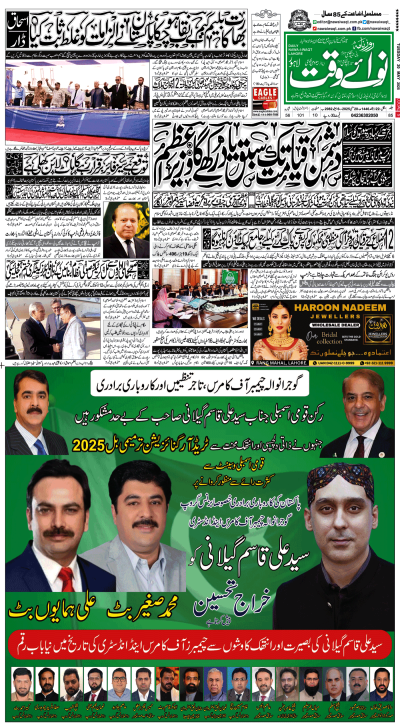This year Pakistan and China have been celebrating 65th anniversary of the establishment of their diplomatic ties. This relationship is unique and every-expanding in all directions without a single iota of doubt. There is no such a cordial relationship that existed in living memory between the two countries in the world like that of Pakistan and China relationship.
The poetic expressions such as “sweet than honey”, “deeper than oceans”, “higher than mountains”, “Iron brothers”, are not showing just emotional feelings, these expressions are based on realities and were time-tested over 65 years in all awkward and pleasant situations.
One can divide the Pakistan-China ties in the following three phases: first 1949-1970, second phase 1970-2007, and third 2007-2016 and onward. During the first phase, they worked on establishing diplomatic ties keeping in view the international situations of the Cold War. In the second phase they focussed on developing defence ties and strategic partnership particularly to provide safe and sustainable defence machinery to meeting the demands of Pakistan Armed Forces. In the third phase both countries laid emphasis on boosting economic ties such as trade and investment.
In all these phases China has played a crucial role to alleviate the status of Pakistan. The role of Pakistan in ending the international isolation of China is admirable by all accounts. There is need to highlight the episode that normalised ties between China and the United States.
Americans also tried other channels such as France, Poland, and Romania to open dialogue with China. However, channel through Pakistan worked as both China and Pakistan built a strong confidence.
Pakistan was an honest messenger between Premier Chou Enlai and President Richard Nixon. On 5 January 1971, Premier Chou Enlai thanked President Agha Mohammad Yayha Khan to convey the message of President Nixon to Premier Chou Enlai about the opening of diplomatic ties between China and the United States.
In 1971 United States showed its intention to establish ties with China. On 21 April 1971, President Yahya conveyed a response from Premier Chou Enlai to President Nixon. It was received by Dr Henry Kissinger, US National Security Adviser, on 27 April 1971. In a hand-written message from Premier Chou Enlai to President Nixon dated 29 April 1971, it was mentioned that President Nixon sent messages to Premier Chou Enlai on 17 May 1971, and 22 May 1971.
In response to these messages Premier Zhou said that Chinese Government would welcome publicly President Nixon, Dr Kissinger or Nixon’s envoy to advance discussions between the two governments. Premier Chou Enlai also mentioned the willingness of Chairman Mao Zedong to open dialogue with the United States, which he expressed in December 1970. Premier Chou Enlai desired that all modalities and procedures of the visit should be carried out through the good-offices of President Yayha.
Therefore, Dr Kissinger undertook a secret visit from Islamabad to Peking on 9-11 July 1971. Premier Chou Enlai specifically mentioned to take a direct flight from Islamabad either on Pakistan’s airline or on a special plane sent by China to Pakistan. He was also allowed to take his special telecommunications equipment to send messages from Peking to Washington, if he desired so.
He was on a grant and historic mission to Pakistan and China. As he ‘disappeared’ from the public and media, it was reported that he got sick and taking rest in Murree, a rest resort near Rawalpindi. But he was on the grand mission to open the dialogue with China – the world’s largest populated country.
The mission remained secret because the Americans were not sure of its success. Chinese wanted it to be opened to public. They, however, understood Americans’ sensitivities. On Dr Kissinger’s request Chinese agreed to guarantee its secrecy. Pakistan also guaranteed its secrecy.
Several Chinese leaders arrived in Pakistan and were waiting on a PIA’s plane for Kissinger’s group. Among Chinese included Huang Hua, later China’s Foreign Minister, Zhang Wenjin, later Chinese Ambassador to the United States, Ji Chaozhu, later Chinese Ambassador to the United Kingdom, and Tang Wenshang, who later served in the Chinese People’s Political Consultative Conference.
Under the plan, Dr Kissinger would arrive in Islamabad and after 24 hours stay, he would disappear in a place in Northern Areas. In fact, he would fly by a PIA Boeing to Peking. A high-level Pakistani official would accompany him to Peking.
His mission was only revealed after talks turned out to be successful in Peking. On his return from Peking to Islamabad, he would resume his onward journey.
Kissinger told the Chinese about President Nixon desire to visit Peking. Nixon visited China after 6 months in February 1972 after Dr Kissinger’s visit
The United States has realised that China posses no the United States’ essential interests world over. The United States decided not to fight against Communism but against the Communist State on case by case basis. Both sides discussed Taiwan, war in Vietnam and the United States decided to leave the war in Vietnam soon as Premier Chou Enlai told Dr Kissinger about Vietnamese resistance against China 2000 years ago.
The United States decided to withdraw its support for the Taiwanese independence as well as opposition to China’s entry to the United Nations. They also talked about the USA-USSR relations, China-USSR disputes, and China-India disputes. Dr Kissinger told the White House about the success of his visit to Peking and asked to keep the issue top secret until his return to Washington. On his return, he told President Nixon about normalisation of ties with China and his visit to Peking. On 15 July 1971, President Nixon publically announced about the visit of Dr Kissinger to Peking.
Pakistan played the role of the most honest broker between China and the United States. One can assume the successful accomplishment of Pakistan’s highly secret diplomacy in such a complicated time of the Cold War. The visit turned a page in history. Pakistan played a cordiale diplomacy bringing China and the United States closer and together. This is a remarkable chapter in history. Neither China nor the United States could forget it.





